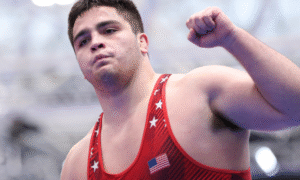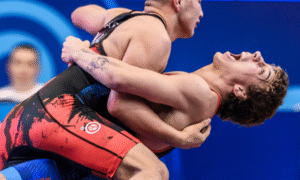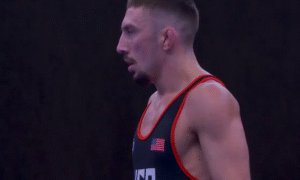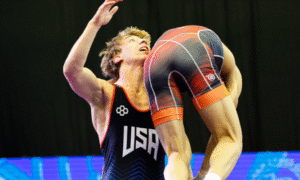2018 US National Champion Ryan Mango (63 kg) is, in a word, valuable.
A two-time NCAA Division I All-American for Stanford — and a lot of other things wrestling-related — prior to beginning his Senior Greco-Roman career, Mango’s exploits on the mat are often described with superlatives. He’s like a walking, talking compressed spring. In a moment’s notice, Mango can go from standing still to exploding on a technique, and before you know it, some guy is head over heels wondering what in the world just happened.
But Mango’s prowess as an athlete is only part of what makes him someone people like having around. There is also his intellect, and with that, his ability to communicate to fellow wrestlers what needs to get done and how to go about it. The career of a full-time Greco athlete often includes a lifetime’s worth of reciprocal “teaching moments.” Knowledge and ideas are passed around and funneled for future use, making everyone involved custodians of education. Mango’s job is to compete and win, but in between, it is also to add to the greater wrestling knowledge base — wherever, with whomever.
For now, what that will all look like comes in the form of gracing the upstart California RTC with his presence. Hosted on the campus of Stanford University where Mango became a collegiate star, the new training facility is in need of a dynamic, “name” athlete to assist in the endeavor of forming its foundation. Not terribly unlike Mango’s first rodeo out west just about a decade ago.
However, Mango’s association with the California RTC does not represent a definitive change in his training environment. The 27-year-old will still be suiting up for Army’s World Class Athletes Program as he strives to make next year’s World Team, and of course, the Tokyo Olympic squad in 2020.
Nevertheless, this development is certainly a candidate for discussion and we caught up to talk about the California RTC, Stanford assistant Nate Engel, and how Mango is planning to fit in his upcoming trips to The Golden State.
Ryan Mango — 63 kg, Army/WCAP
5PM: When did the idea of you becoming involved with the California RTC begin to materialize?
Ryan Mango: You know, I’m an alumni, I have my own goals and agenda in Greco, but I do keep in touch with the Stanford guys and I’m always going to help them in any way I can. We talk occasionally and they hit me up, Hey, we’re coming out to that training camp at the Air Force. Their preseason camp, basically. I told them, I can make it up there, wrestle with the guys. That’ll be awesome.
So then they talked to me and described the RTC. When they came out here, I went over to the house they were staying in, hung out with the guys a little bit, and talked to the coaches. They explained the opportunity, Hey, we’re not going to take away from your schedule, we’re not going to do any of that. We’re just willing to support you and have you come out to Stanford and train with the RTC athletes. Plus, me being a Senior-level athlete helps, as well.
They introduced it to me like that and I’m always down to help. I was excited about the opportunity. I talked to Coach (Shon) Lewis and some of the people on my end, and they didn’t have a problem with it. It was really quick, actually. That’s how it happened and then I was out there for my first trip.
5PM: What role did Nate Engel play in all of this?
Mango: Nate, I’m sure it was his idea because I know he’s going to be involved with the RTC and all that. Plus, he’s a Greco guy and there’s not a lot of Greco in the Bay Area. It’s a good market to target, I think, and it’s super-helpful for the folkstyle wrestlers in the Bay Area, anyway. Obviously, anytime you can wrestle all three styles it’s great for your wrestling overall.
So yeah, I would say Nate was probably pretty instrumental in setting it up. He’s my main contact, so to speak. Although I talk to all of the coaches, he’s the one kind of steering the ship in getting me out there and all that stuff. He’s definitely involved and him being a past Greco guy definitely sparked the idea, or at least put the idea in their heads and took it from there.
5PM: There was confusion initially. So just to clear it up for anyone who was under the wrong impression, this does not change anything involving your career with Army/WCAP. You are still an Army Greco-Roman athlete. It’s more that you are going to be helping build up the California RTC, correct?
Mango: Correct. Everything with WCAP is staying the exact same, it’s just something I can do during downtime. You know, there are times throughout the year when you’re training and going through the cycle with your guys and your club — whether that’s Northern Michigan, the Army, Sunkist, wherever that is. It’s just something to where if I have three or four months without a competition, or two to three months without a competition, for just two of those weeks it’s not a bad idea to get out of that training. I’ll still train, but in a different environment with different coaches, and help out different people. That’s really the idea behind it. It’s not to take anything away from my training here at WCAP, or the fact that I’m associated with WCAP full-time. It’s just something additional that I can do to diversify my training as well as help them at the same time, helping them develop their RTC.
5PM: You’re more of an objective, analytical sort. It’s the way you intimate ideas and explain things. But does this situation with the California RTC and Stanford stem from an element of sentimentality, as well?
Mango: I mean, for sure. I’ll go back to when I being recruited. I was highly-recruited coming out of high school and a lot of people thought I was crazy for going to Stanford. My mentality was, I can do it, so long as I have coaches who support me, coaches with whom I’m I’m comfortable, and athletes I can train with. If I have that, I can do it anywhere. Obviously, I didn’t get it done in the sense of becoming a National Champion — but we did grow our program. Outside of Tanner Gardner and Matt Gentry, no one could probably name even five Stanford wrestlers when I went there. Now, we’ve had Nick Amuchastegui, Zack Giesen, me…we’ve grown the program to attract guys. Even transfers, like Joey McKenna, Connor Schram, and Paul Fox, who’s an All-American now and returning the to the team.
The way I look at it is that we changed the culture at Stanford. The guys who went there with me, the coaching staff, we worked to change the culture. That is something I hold dear in my heart and I am definitely sentimental towards the Stanford program. Anytime I can help out I want to do that, especially with all of the support they gave me over the years I was there. Overall, there’s a sense of pride behind it. When I talk about Stanford, there is a sense of pride, and anyway I can help out I am definitely going to, especially if it is to enhance my own training as well as benefit their RTC program. That’s how I look at it, and I think that’s how the coaches look at it, too.
CLICK HERE TO DONATE TO THE USA GRECO-ROMAN PROGRAM
SUBSCRIBE TO THE FIVE POINT MOVE PODCAST
iTunes | Stitcher | Spreaker | Google Play Music | RSS



















